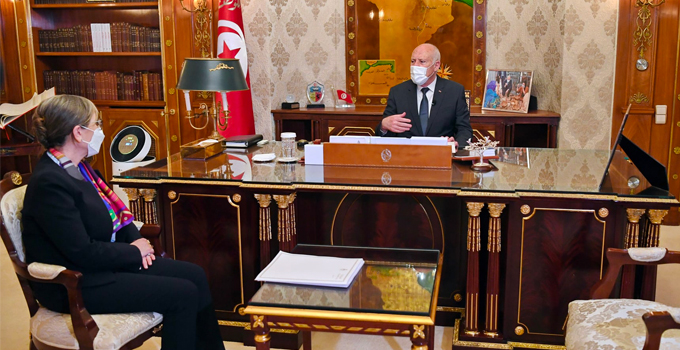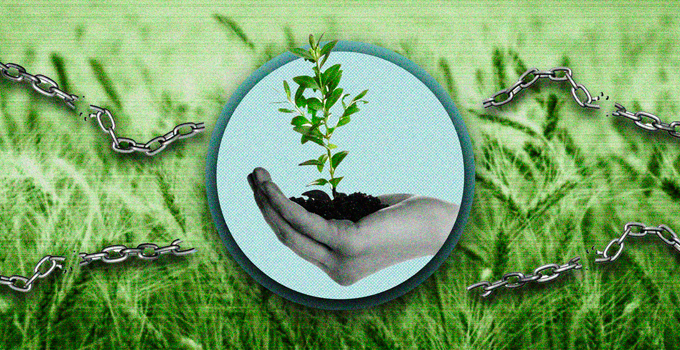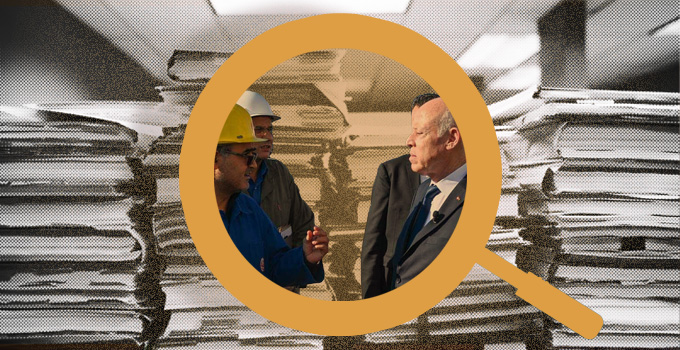
The white smoke that Tunisian authorities had long awaited finally materialized on October 15, 2022, in the form of an accord with the International Monetary Fund (IMF). In a press release issued that day, the world’s great financier announced that « IMF staff and the Tunisian authorities have reached a staff-level agreement to support Tunisia’s economic policies with a 48-month arrangement under the Extended Fund Facility (EFF) of about US 1.9 billion ». Following long and difficult negotiations which dragged out over a two-and-a-half-year period, the agreement was concluded. It will not, however, go into effect until receiving the green light from the IMF’s Executive Board, scheduled to make its decision in December.
Run with the hare and hunt with the hounds
For the Tunisian government, the hardest part is yet to come. Authorities will need to run with the hare and hunt with the hounds. On the one side, the IMF with whom the government has signed on its commitment to implementing the vital and difficult structural reforms that have been kept on the back burner for the past five years. On the other side, the country’s most economically and financially fragile groups who are likely to pay the highest price for these changes.
Having carefully avoided these painful, and therefore unpopular, surgical operations for fear of stirring up anger in the street, Tunisia’s successive governments ultimately provoked the wrath of the IMF. As a result of Tunisia’s failure to make good on its commitments conditional to the 2.8 billion dollar loan that was granted in May 2016, the Fund took the decision in 2019 to block the final 1.2 billion dollar installment.
Which explains why, this time, the IMF insisted on two things. During a conference in May 2022 on economic relations between Tunisia and France, the French ambassador to Tunis, André Parant, stated that the IMF was waiting for the Tunisian government to « implement two or three key measures in order to demonstrate its will to undertake reforms » before the opening of negotiations. The government did so, notably with regard to the sensitive issue of subsidies for the cost of basic goods and hydrocarbons.
Next, the government abandoned its « zero communication » policy adopted by previous administrations. Ultimately, the IMF succeeded in convincing Najla Bouden’s government to speak to Tunisians about the importance of programmed structural reforms and the sacrifices that they necessitate. The government complied with that request for the first time on June 3, 2022, publicly presenting its reform program.
Tunisians thus became privy to the government’s plans for getting the country back on its feet: the implementation of « urgent economic measures », an « economic and financial stability program », « structural reforms », a « 2023-2025 economic and social development program » and « Vision Tunisia 2035 ».
Urgent measures
The 43 urgent measures prescribed to resuscitate Tunisia’s economy are organized into four categories: enhancing liquidity and facilitating business access to financing, promoting investment, improving the business climate and facilitating formalities to promote exportation.
The most pressing issues include reforming the system of subsidies which covers basic goods and hydrocarbons, and restructuring public companies.
On the first point, the IMF highlighted in its press release on October 15 that the objective is to « contain expenditures and create fiscal space for social support » and that authorities « have already taken steps to contain the civil service wage bill and started to gradually phase out generalized wasteful price subsidies through regular price adjustments that link domestic prices to international prices, while providing adequate targeted protection to vulnerable segments (including through social transfers) ».
As they await publication of the latest Letter of Intent on the basis of which the new loan will be granted, IMF staff and the Tunisian government do not appear to converge on this issue. While the IMF mentions controlling the wage bill for civil servants, the government document released on June 3 makes no such reference. The explanation for this « omission » became clear on September 15 upon the announcement of a salary increase in the civil service sector between 2023-2025.
Although the two parties do concur on the topic of public companies, there is one apparent discrepancy. Six days after the announcement of its agreement with Tunisia, the IMF’s general director Kristalina Georgieva stated to Sky News Arabic that « the Tunisian government proposed privatizing public companies », a proposal which was not discussed in the IMF press release.
The Tunisian government has also exercised caution in addressing this issue, strategically avoiding the word that is sure to upset certain parties, namely the UGTT: privatization. While recalling that it has made progress in terms of business reform and that measures already implemented include the sale of « non-strategic participation in mixed banks (Tunisian Foreign Bank, Bank of Tunisia and the Emirates, Tunisia-Kuwait Bank), the government outlines its reforms for public companies across six areas. The plan includes a series of five actions. The first, the elaboration of a strategic vision for the government’s role in public companies and an audit by external offices. The second, the preparation of a program to liquidate the government’s cross-debts. The third, to improve governance by revising legislation. The fourth, to prepare a restructuring program. The fifth, to establish a list of public companies operating in strategic sectors. Which implies privatization.
Removal of subsidies
And lastly, what remains the most difficult challenge facing the Tunisian government: the removal of subsidies for basic goods and hydrocarbons, as recommended by the IMF.
The IMF is well aware of this challenge and its social implications. In its October 15 press release, the Fund observed that « authorities have already taken steps to contain the civil service wage bill and started to gradually phase out generalized wasteful price subsidies through regular price adjustments that link domestic prices to international prices, while providing adequate targeted protection to vulnerable segments (including through social transfers) ». The IMF recommends that Tunisia « strengthen the social safety net ». This would mean somehow ensuring that the removal of subsidies be made painless for the country’s most insecure, impoverished segments. Can the government fulfill this assignment? How does it intend to set about trying?
As per the program revealed in June, the government is planning to set up « a new scheme in order to direct subsidies to those who need it and to adopt an incremental approach to price adjustments over four years beginning in 2023 ». To this end, the government will adopt the principle of open registration « with the aim of enabling all families to benefit from financial transfers » and « all means possible for registering beneficiaries, notably the electronic platform—now online—to guarantee transparency in the disbursal of subsidies ».
Nicolas Boileau once said that « Whatever we conceive well, we express clearly ». The Tunisian government misses the mark by a long shot in this regard, since its presentation of the disbursal scheme for granting aid to needy families is anything but clear.
Moreover, it remains to be seen whether or not the disbursal scheme is capable of identifying individuals and families most in need of assistance. How will the government determine who truly qualifies for aid and who does not? And how is the verification process to avoid being undermined by nepotism, special privileges and corruption?
The government’s stated preference for a self-reporting system following the removal of subsidies is all the more surprising given that it has already invested in the elaboration of another program that is far more accurate and reliable and which, according to authorities, is soon to be up and running: a biometric unique identifier system.
In December 2020, the group formed of two Tunisian companies, IT Serv et Cynapsys, was selected through an open call to develop—thanks to funding granted by the African Development Bank (ADB)—the infamous unique identifier system.
One year later, following a work session with the National Authority for the Protection of Personal Data (INPDP), the National Center of Informatics (CNI) and representatives from the Interior Ministry and consulting firm in charge of the project, the Ministry of Communication Technologies confirmed « the need to implement the system elaborated as soon as possible ». A demand which offers little reassurance with regard to the imminent realization of this project which has been on the table since 2014. Instead, we are left wondering if the project’s delay has not caused the government to experience a change of heart regarding its application.
Tunisia’s new agreement with the IMF is just two months away from becoming operational. The government itself, however, is far from being prepared to navigate what follows once it begins the precarious task of dismantling the subsidies system which covers basic goods and hydrocarbons. Rather than alleviating pressure on the country’s most vulnerable groups, it is likely to incite anger and indeed set off the social time bomb that it had hoped to disarm.







iThere are no comments
Add yours